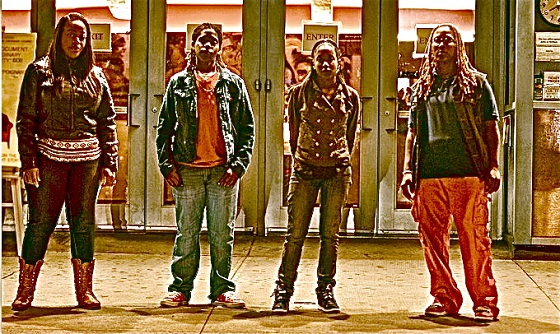
In August of 2006, seven friends, New Jersey Afro-American lesbians all, decided to check out the West Village in Manhattan to escape the engrained homophobia of Newark. "That night we didn't have a destination. We came to the Village to have fun. Look at the girls. Be gay," one noted.
But as the septet was walking past the IFC Center, a multiplex art house on the Avenue of the Americas, Wayne Buckle, 28, who was sitting on a fire hydrant, tried to pick up one of the ladies, Patreese Johnson. When Johnson noted she was gay, Buckle was said to have made homophobic comments, reportedly employing such terms as "dyke," and "lesbian bitch," plus an antisocial phrase or two including "I'll fuck you straight, sweetheart" and "Let me get some of that."
Then he apparently spit on and threw a lit cigarette at the young women and approached them menacingly. Within the next four minutes a violent to-do occurred where the ladies were punched and one had her dreadlocks pulled out. Oh, by the way, Mr. Buckle was punched, too, and non-fatally stabbed with a kitchen knife and was taken to the intensive care unit at St. Vincent's Hospital.
The next day the tabloids had a field day with headlines screaming the exploits of a "Gang of Killer Lesbians." Even Bill O'Reilly commented on the matter as only O'Reilly can.
All the women, of course, were immediately arrested. And in the coming months, three pled guilty and four proclaimed their innocence. All were convicted, and Blair Dorosh-Walther's fiercely moving new documentary, a highlight of the current Human Rights Watch Film Festival, focuses on the latter four, chronicling the women's lives before and after The Incident.
What part, the film queries, did racism, homophobia, and misogyny play in the convictions? Were the women defending themselves or overreacting? Why were three of the verdicts eventually overturned and one shortened? And what was the aftermath?
Since Mr. Buckle seemingly refused to participate in this project, only his testimony at the trial is heard here. An actor reads it. Also, we never see his face or even hear his name spoken. But we are told several of his online messages on various sites avowed that "women should welcome your advances because that's how the race should propagate itself" and that he equates gay rights with devil rights. Then again, without his presence, you can't help but demonize the man, who is convincingly envisioned here as an emblem of all that's wrong with the heteronormative patriarchy.
And Johnson, who had met other Buckles in her life, as had her friends, was always told by her brother to carry a knife to protect herself. She lived in a neighborhood where that sort of advice made sense:
"It made me feel safe to carry a knife on meself, but when I get out, I'm going to carry no weapon because a weapon caused me to be in this situation."
Renata Hill, another member of the party, had also experienced brutishness from her childhood on: "I was ashamed to tell my story of how I was raped [by my stepfather] and how I was abused because of how people would look at me. Me being nine years old, there was no way I could defend myself against this man. He ended up getting five years for it. Five years, and I get eight years."
What would have happened if these were seven white women defending themselves? One interviewee notes, "If you are a black person, you don't have a right to defend yourself." And if you are black, a woman, and a lesbian, neither do you have the expectations that the legal system and the media and the public at large will treat you as innocent until proven guilty.
Among those letting their voices be heard here are Angela Davis, lawyers, police, family members, and this sisterhood who did not let their incarceration break them. Consequently, Out in the Night is an empowering, troubling, illuminative work and one of the more unforgettable documentaries of 2014.
